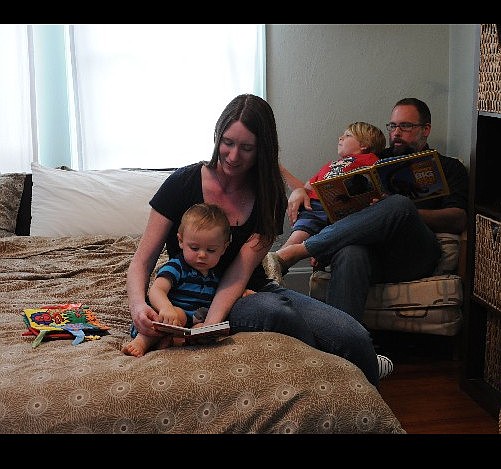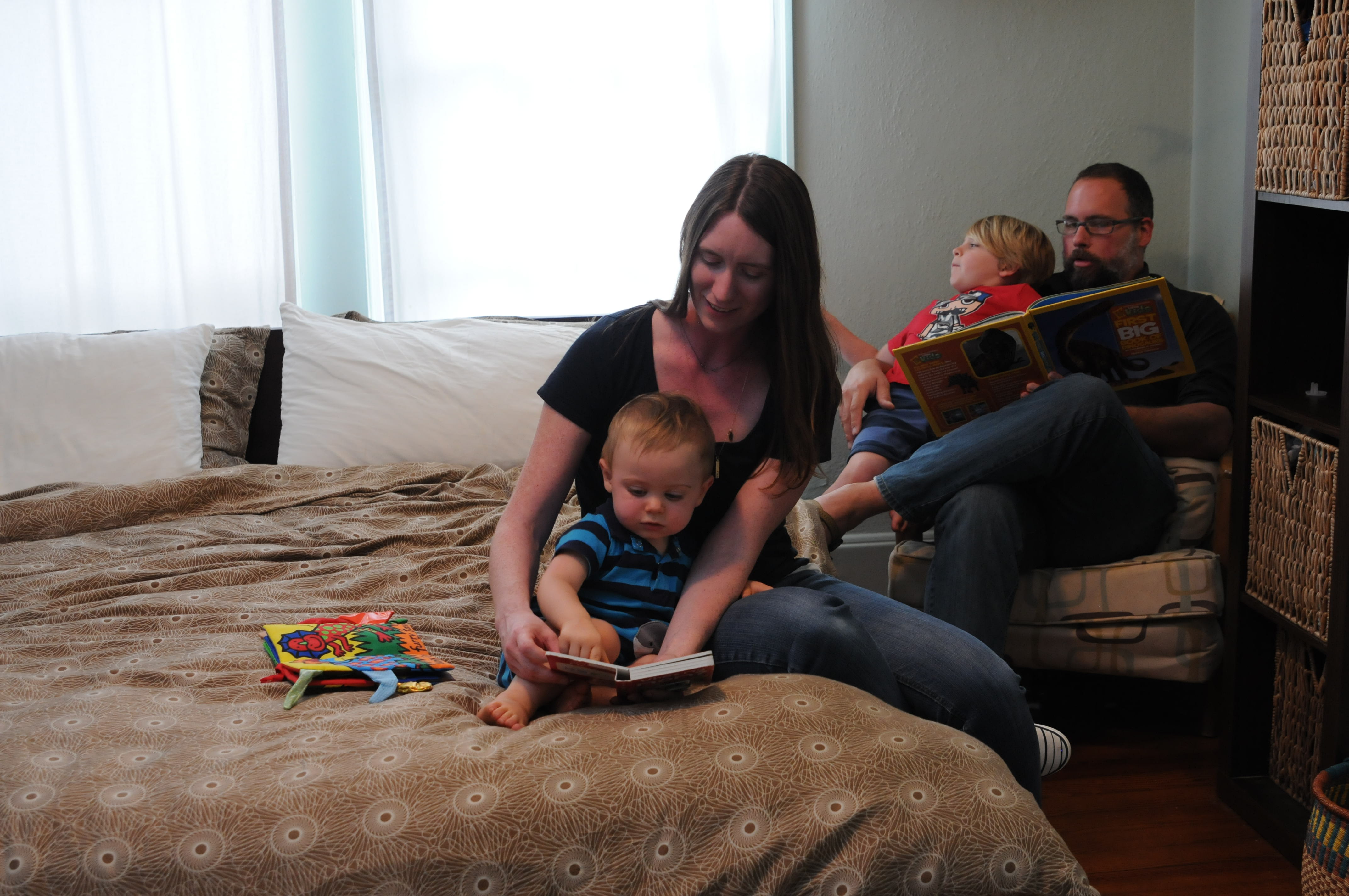At some point, most parents know the feeling.
The touch of a tiny hand on their shoulder, a small voice in their ear, a gentle tugging of the covers. Their child has just climbed into bed with them.
Whether the child is sick or had a nightmare or just needs comfort, it happens.
But many parents today are choosing to have baby in bed with them all night. And some continue the practice even after the baby is no longer a baby.
In fact, this latest "trend" even has a name -- bed-sharing -- and a related idea called co-sleeping, which has the child in the same room, either in a crib or a co-sleeper (basically a bassinet) that is attached to the bed, but not directly in the bed with mom and dad.
Proponents say these are hardly new concepts, and that the United States is one of the few civilizations that doesn't do either. Medical researchers, however, say bed-sharing, especially for newborns and young children, is dangerous because of the potential for sleep-related deaths, including Sudden Infant Death Syndrome (SIDS).
"Don't do it," says Dr. Michael Warren, a pediatrician with the Tennessee Department of Health.
His department researches all deaths of young people under 17 and sees between 100 and 120 sleep-related deaths each year in the state, he says. Those figures represent about 20 percent of the total infant deaths in the state each year, and bed-sharing is one of the three most common risk factors in the sleep-related deaths, studies find.
Researchers have gone back and looked at cases that were labeled as SIDS and found that, in most cases, the actual cause could be attributed to unsafe sleeping conditions, including a parent who had fallen asleep and rolled over onto the child. Beds cluttered with too many pillows, stuffed animals or blankets are also unsafe, he says.
"There has been a shift in the diagnosis," Warren says.
The American Academy of Pediatrics came out against bed-sharing in 2005, and Warren says the academy also recommends that parents follow the ABC's of sleeping when it comes to small children.
Alone.
Back.
Crib.
As in, "Alone in a crib, sleeping on his or her back."
In addition, U.S. parents are often advised by doctors and other medical practitioners -- not to mention mothers, fathers, mothers-in-law, other relatives and friends -- about "not letting baby into the bed." The general belief is that putting them into their own bed in their own bedroom promotes independence.
And beyond that, it can be hard to get a baby out of Mommy and Daddy's bed once the pattern has been established.
Co-sleeping and bed-sharing proponents counter that the practices are safer for the baby because a parent, usually the mother, is close at hand. It's also easier to breastfeed in the middle of the night, and the mother and baby develop a much closer, and therefore healthier, bond, sometimes even breathing in sync.
Divided discussions
The debate has become somewhat testy among proponents on both sides.
"The conversation has become so heated that it has become a thing and I'm not sure why," says Rebekah Bissell, mother of 5-year-old Linnera and 3-year-old Isaiah.
Chapel Cowden, 36, and her husband David Hedrick, 41, decided to bed-share with their first child, Asa, now 6, and are bed-sharing with their second, 17-month-old Finn. For them, the decision was both practical and philosophical.
"For one thing, if you are breastfeeding, it's a challenge to get up 10 times a night," Cowden says. "Plus, we felt it was a more natural way to raise a child to give them that comfort that they need."
But she acknowledges that they heard plenty of advice about bed-sharing before and after Asa was born.
"Since he was our first, we felt some of that pressure that families feel to boot your child," she says. "In the U.S., we feel the child should be independent and I think I felt a little pressured by that, but I also am not one to let our child lay somewhere and cry."
Asa stayed in the bed with them for about a year before they began transitioning him to his own bed in his own room, though he occasionally still crawls in with them, Cowden says.
Bissell, 34, shared her bed with both of her children, but moved them into their own beds when they were about 1 year old. So did Sara, 37, and Rick Apgar, 39. They did co-sleeping with the oldest, now 6, and bed-sharing with the youngest, who is now 2.
"The second has not been a great sleeper," says Sara, who declined to give her chidlren's names.
She says they decided to co-sleep and bed-share for a variety of reasons, including philosophical, safety and mother-child bonding.
"It was a combination of all of those," she says. "There was something about having them in a separate room when newborns that seemed very odd to me.
"We had a co-sleeper because, as new parents, we were aware of the dangers, and he seemed to sleep better out of the bed. I was breastfeeding, though and if he fell asleep I thought, 'Well, I'm not going to wake him up to put him to bed."
She says her midwife encouraged her to bed-share with the second child in part because it was easier to nurse him lying down.
Studies
The idea of infant independence is strong in the U.S., more than in other countries. In comparison to the U.S., for example, 93 percent of children in India between the ages of 3 and 10 share beds with their parents, according to a 2006 study by the Journal of the Indian Academy of Pediatrics.
But bed-sharing is on the rise in America. In a survey of about 19,000 parents in 2010, 13.5 percent said their infants usually shared a bed, either with parents or another child, more than double the number from 1993. Published in the journal JAMA Pediatrics, the study showed that bed-sharing is most common among black and Hispanic families, with almost one-third of black parents saying their baby slept with an adult or another child.
However, a study published in July suggests that bed-sharing is dangerous, especially for very young infants.
Reported online in the journal Pediatrics, the study analyzed 8,207 infant deaths between 2004 and 2012. The data, gathered from 24 states by the National Center for the Review and Prevention of Child Deaths Case Reporting System, showed that about 70 percent of the infants, who were between the ages of newborn and 1 year, were bed-sharing at the time of their death.
"Bed-sharing for 0-to-4-month-old babies is extremely risky," Dr. Rachel Moon, a pediatrician and sudden infant death syndrome researcher at Children's National Health Hospital and an author on the study, told The Huffington Post. "In this study, this sleep situation presented the most important risk for infants in this age group."
Making adjustments
All the parents say that, while philosophically they feel co-sleeping or bed-sharing is the right way to go, there are practical considerations to be taken into account no matter which route a parent takes.
Namely, not all houses are built the same, they say, meaning some bedrooms are farther away than others, which makes it harder for parents to hear a crying baby or one that's stopped breathing. And not all babies are built the same. Some sleep better than others; some have health issues that can influence where a baby might sleep.
On the downside, babies that fidget a lot can keep mom and dad awake, so parents may become exhausted and less likely to wake up should the baby need help.
Warren says there are numerous things a parent should consider if they insist on bed-sharing, though he points out that the American Academy of Pediatrics stresses that no method of bed-sharing is without risk.
Parents should be healthy, not obese and avoid smoking cigarettes, taking drugs and drinking excessive amounts of alcohol, he says. They also should avoid becoming overly fatigued, "which is difficult to do as a parent in the first place.
"Even when mom breastfeeds and there is no smoking or alcohol us, bed-sharing increases the rate of death by nearly three-fold," he says.
"The other thing is, it is very easy today to find information that will support something you want to believe," Warren says. "Be good consumers of the information.
"Lots of parents will say, 'I did bed-sharing with all my children and nothing happened.' That's the same argument people use for not using car seats."
But whether it's a child escaping injury in a wreck even though they're not in a car seat or not having any problems while bed-sharing with your infant, Warren has a simple explanation:
"You got lucky."
Contact Barry Courter at bcourter@timesfreepress.com or 423-757-6354.

